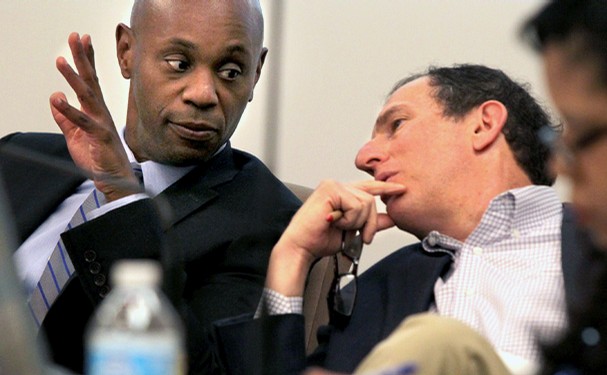Shelby County Schools Superintendent Dorsey Hopson is like the proverbial guy trying to change a tire on a car going 100 miles per hour.
There’s just so much that can go wrong.
Despite generally favorable reviews – and already talk of a contract extension (which seems premature) – and his adroit handling of the most complicated political and educational landscape devised by man in the merger and un-merger of all public schools in Shelby County, he’s managed to prevent the catastrophes predicted by the suburban critics who love to malign all things Memphis and who seem to relish any difficulties that besetsthe city that drives their economies and largely provides their quality of life.
Of course, Mr. Hopson’s challenges don’t just involve the newly formed municipal school districts, but also involve charter schools, Achievement School District schools, innovation Zone schools, Gates Foundation programs, Race to the Top issues, and God knows what else. Into this jumbled mix, he must put together yet again a realigned management team, cadre of teachers, and a network of programs to support the academic improvement by which Mr. Hopson will ultimately be judged.
Dog Eat Dog
As our dear friend Carol Coletta has said, “Culture eats policy for lunch,” and she is inarguably right. That in turns point up one of Mr. Hopson’s biggest challenges, because superintendent in and superintendent out, the culture of the school system has been an obstacle to it achieving its top goals.
This of course is regularly the case for all large bureaucracies, including Memphis and Shelby County Governments. Some years ago, while serving as county mayor, A C Wharton said that his toughest job was changing the culture and we suspect he’s found city government no different. That’s because rank and file employees and middle managers figure they can always wait out the new administration, and in doing so, they often adopt the language of the new bosses while doing nothing to change their behaviors.
Already, we are hearing stories like this leaking out of Shelby County Schools. The culture has already been successful in driving out some qualified administrators, particularly if they are perceived as agents of change. In addition, it’s clear to most observers that Mr. Hopson needs to send the message that he understands the importance of professional educators in his cabinet, particularly in the wake of the exit of former Academic Officer Roderick Richmond.
Meanwhile, the website for the district looks like something left from a first generation website kit, and surely, it is a priority to create a user friendly, navigable, and accurate source of information on the Web. Speaking of Mr. Richmond, the district’s website still lists him as chief academic officer although he’s been gone six weeks, and information on one page of the website sometimes doesn’t agree with information on another. But with all that’s facing the superintendent, we’re pretty sure he doesn’t spend a lot of time on the Shelby County Schools website, but somebody should.
The Big Challenge
Back to the issue of culture, we remember that former Superintendent Kriner Cash said the two things that surprised him most were the depth of entrenched poverty here and the obstinance and lack of innovation that ran deep in the central office. We’re not sure that’s changed, but we’re hopeful that Mr. Hopson can do something that was an organizational obstacle for his predecessors.
The Hopson agenda is coming into clear focus and there is much that we like, notably the deep commitment to putting a highly qualified teacher in every school classroom. This can be transformational to Shelby County Schools, but more to the point, it can be transformational to Memphis itself.
Too many people delude themselves into thinking that the more than 100,000 students who live inside Memphis aren’t relevant to them but we ignore these young people at our peril. With no in-migration of new talent and with the exodus of college-educated, 25-34 year-olds, we don’t have the luxury of thinking that we’ll bring in enough new talent to offset our failure to educate these students.
Like only a handful of cities in the U.S., the students in our urban school district will drive everything in their path – the economy, the quality of life and our ability to compete. But before we succeed at that, Mr. Hopson must change a culture that tends to strangle all innovation in its crib.
Ending Top-Down Decisions
Part of the reality for each superintendent is that they bring a new group of solutions with them, and with the average urban superintendent staying about four years, a student who attends Memphis City Schools from pre-K to high school graduation can witness three different plans to turnaround Memphis City Schools (think Gerry House and Carol Johnson) before they get their high school diploma. That’s part of the problem. If Memphis City Schools (and many other urban districts) are known for anything, it is policy churn.
Generally, each new superintendent throws out all that came before and this constant stopping and starting prevents any momentum for progress. So far, Mr. Hopson seems to be building on progress made in the past while adding his own additional agenda items.
At its most basic, the problem of the top-down culture at our school district is a no-brainer. It has to end.
As one long-time administrator has said, “The best thing would be to burn the place down and start over.” But short of a pyromaniac’s dream, the objective is to end the central office-centric attitude that so often characterizes decision-making and to remind everyone there that their jobs are to serve the schools and not the other way around.
Keys to Success
As Mr. Hopson comes to grip with cultural change that is needed, we offer a few keys to success:
* Establish a “no excuses” philosophy for every student and every parent.
* Develop a widely-owned philosophy of teaching and learning built on buy-in that is broad and wide.
* Build trust and encourage risk-taking built on a foundation of predictable behaviors and consistent messaging that appreciate people who are willing to innovate.
* Base decisions on data to eliminate favoritism and politicized decisionmaking so people are rewarded for what they know, not who they know.
* Encourage a culture of continuous learning and professional development.
* Acknowledge non-negotiables to be clear about the essential elements of the agenda, inviting discussion about building a program with input from senior management but also support staff and principals.
* Encourage interconnectedness and cross-department problem-solving.
* Pursue collaboration inside and outside the district, because it’s more important now than ever.
In the end, the goal that we all should support is this: to create a culture at Shelby County that is one of trust, openness, communications and continuous improvement, the keys to long-term reform and fulfillment of high expectations.





Thanks for writing this, its always good to get the perspective of someone who’s been in Memphis for a while and seen the churn and its products. I do have one contention with your recommendations at the end; nothing is said about teachers. We’re the ones that make the magic happen, and simply reforming the central office staff won’t magically trickle down into the teaching force if not directly addressed with appropriate strategies. For example, “establishing a culture of continuous learning” won’t work unless teachers are engaged. For too long MCS and now SCS PD has been a joke, a time for teachers to get work done or grade tests simply because the quality is so spotty. Without direct teacher engagement playing a role in reforming issues like this, even the best intentions won’t transform the entire district culture.
Amen. Amen. Amen. Interestingly enough, a model of the kind of culture you are advocating already exists in Memphis. The Collegiate School of Memphis combines a culture of no excuses for all; involved (teachers, parents, students, etc…) with a data driven practices and a uniformity among all classrooms. Despite the fact that this is a Christian private school, these practices can be replicated in individual schools and, more importantly, district wide. Collegiate’s demographics roughly match those of Memphis at-large, and the students respond wonderfully to the rigor and high expectations. Much of the strategies and tactics at Collegiate are taken from Doug Lemov’s Teach Like a Champion which is a must read of best practices for great teachers. I am not an apologist for private schools, though there are several that are part of the solution in Memphis and not the problem; rather I think Collegiate has tapped into a set of practices that are empircally proven to drive students towards college success. It would take a bit of creativity to apply these principles to a whole district, but it can be done, and, more importantly, it has to be done if we are to serve the most vulnerable among us.
I know that it’s hard for regular readers to believe it, but we were concerned that this post was running long, so we eliminated explanatory sentences that followed each of italicized “keys to success.” Some of them referred the importance of teachers and the need to quit treating teaching as if anybody can do it. In retrospect, we should have left them in, but we agree completely bluffcityed in this regard.
Thanks, Harvey, for the information about the Collegiate School of Memphis, whose lessons should be integrated into SCS programs and plans. Every school’s experience is relevant to the ultimate objective of urban education – proving that the most vulnerable can succeed and excel, and we have wished that SCS doesn’t use its leadership to convene such a group to exchange lessons and learn from each other’s experiences. There is no purpose in adversarial relationships when the goal is so important.
I would also like to see the district embrace some of the strategies that have worked in our more successful charter schools. Charters get a bad rap for allegedly skimming the best, and to be sure some students are let go. But the same goes on with district schools. My former MCS school (won’t say which) was considered by many as a last stop for kids who had bounced around the district before being sent to an alternative school. There are many charters, including my current school, Soulsville, that have found tried and true methods to work with struggling or hard to reach students to help them overcome their challenges. The district could learn a lot from these schools.
The above recommendation by Bluffcityed to draw knowledge from the Charters is exactly what the first person to suggest charters wanted. That was Arnold Shanker, the president of the AFT, the more militant teachers union.
Anonymous: We don’t know about Shanker, but the conservative supporters of the charter movement in Tennessee made exactly the same argument mentioned by Bluffcityed.
What do you mean by “no excuses”?
I find that a perfectly rational list of barriers to which we could find solutions collectively can be called “excuses” instead of reasons, particularly when those making the list have little power or access to power. But a rationalized list of “causes” used to minimize or shift responsibility for systemic biases and failures can be called “reasons”.
Could you explain what you mean here?
And the idea of charter schools did largely originate with Shanker of the AFT, but they are nothing like what he envisioned. It is one of the greatest political ironies in schooling.
http://dianeravitch.net/2013/10/26/albert-shanker-on-charters-1988/